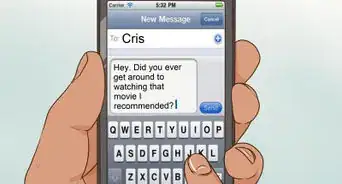This article was co-authored by Lisa Shield and by wikiHow staff writer, Kira Jan. Lisa Shield is a love and relationship expert based in Los Angeles. She has a Master's degree in Spiritual Psychology and is a certified life and relationship coach with over 17 years of experience. Lisa has been featured in The Huffington Post, Buzzfeed, LA Times, and Cosmopolitan.
There are 12 references cited in this article, which can be found at the bottom of the page.
This article has been viewed 6,737 times.
What do Oprah Winfrey, Steve Jobs, and J.K. Rowling have in common? They all faced rejection at one point or another before they became super successful.[1] In fact, everyone experiences rejection from time to time, whether it’s getting turned down for a job or a date. It can feel super tough when you feel like you’ve been hearing “no” than “yes.” The good news is that dealing with rejection in a productive, healthy way will build your resilience, and hearing “no” multiple times just means you get more chances to build your mental toughness and strength.
Steps
Expert Q&A
-
QuestionHow can I avoid the suffering caused by rejection?
 Lisa ShieldLisa Shield is a love and relationship expert based in Los Angeles. She has a Master's degree in Spiritual Psychology and is a certified life and relationship coach with over 17 years of experience. Lisa has been featured in The Huffington Post, Buzzfeed, LA Times, and Cosmopolitan.
Lisa ShieldLisa Shield is a love and relationship expert based in Los Angeles. She has a Master's degree in Spiritual Psychology and is a certified life and relationship coach with over 17 years of experience. Lisa has been featured in The Huffington Post, Buzzfeed, LA Times, and Cosmopolitan.
Dating Coach You should have family and friends who can help you when you are feeling hurt. You can try to understand the reason for your rejection by reading books. Besides this, you can also learn how to rectify your mistake.
You should have family and friends who can help you when you are feeling hurt. You can try to understand the reason for your rejection by reading books. Besides this, you can also learn how to rectify your mistake. -
QuestionShould I hire a coach to overcome the fear of rejection?
 Lisa ShieldLisa Shield is a love and relationship expert based in Los Angeles. She has a Master's degree in Spiritual Psychology and is a certified life and relationship coach with over 17 years of experience. Lisa has been featured in The Huffington Post, Buzzfeed, LA Times, and Cosmopolitan.
Lisa ShieldLisa Shield is a love and relationship expert based in Los Angeles. She has a Master's degree in Spiritual Psychology and is a certified life and relationship coach with over 17 years of experience. Lisa has been featured in The Huffington Post, Buzzfeed, LA Times, and Cosmopolitan.
Dating Coach A coach can give you the correct guidance and help you to overcome your fears. They can help you to proceed confidently in your relationships.
A coach can give you the correct guidance and help you to overcome your fears. They can help you to proceed confidently in your relationships.
References
- ↑ https://www.entrepreneur.com/article/311319
- ↑ https://kidshealth.org/en/teens/rejection.html
- ↑ https://kidshealth.org/en/teens/rejection.html
- ↑ https://www.latimes.com/business/la-fi-career-coach-job-rejection-20170317-story.html
- ↑ https://www.psychologytoday.com/us/blog/friendship-20/201812/8-ways-catch-all-or-nothing-thinking
- ↑ https://ideas.ted.com/why-rejection-hurts-so-much-and-what-to-do-about-it/
- ↑ https://hbr.org/2020/03/how-to-bounce-back-from-rejection
- ↑ https://www.mentalhelp.net/blogs/rejection-and-how-to-deal-with-it/
- ↑ Lisa Shield. Dating Coach. Expert Interview. 11 March 2021.
- ↑ https://www.apa.org/monitor/2012/04/rejection
- ↑ https://hbr.org/tip/2020/07/turn-rejection-into-a-learning-opportunity
- ↑ https://kidshealth.org/en/teens/rejection.html
- ↑ Lisa Shield. Dating Coach. Expert Interview. 11 March 2021.
- ↑ https://www.psychologytoday.com/us/blog/thriving101/201012/rejection-losers-guide
- ↑ Lisa Shield. Dating Coach. Expert Interview. 11 March 2021.
- ↑ https://www.psychologytoday.com/us/blog/fighting-fear/201308/how-cope-rejection





































































